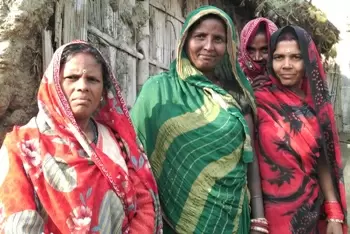One single programme made many women realise their latent potential
16-March-2015
Vol 6 | Issue 11
When Udia Devi, Kumia Devi, Sitli Devi, Rajni Devi and Lalpari Devi were married in their teens they had no idea of the world outside the four walls of their homes.
Their entire lives revolved around their husbands and children and they were convinced that the only work they could do well was cooking, cleaning and looking after their families. Today, all of them are in their fifties and they have shed their shy and reticent demeanour to emerge as capable, vocal community leaders and astute businesswomen.
 |
|
A group of women in Bihar’s Madhubani district, famous the world over for its beautiful folk art, have used their inherent ingenuity and resourcefulness to become successful fishery entrepreneurs (Photo: Alka Pande\WFS)
|
Take the case of Udia, the only woman in her village cooperative committee whose directives are followed by the men without any questions asked, or Kumia, who is a successful entrepreneur with earnings of Rs 50,000 a month. But how did these seemingly ordinary women manage to transform their lives so radically?
It all began a decade ago when the Poorest Area Civil Societies (PACS) programme, an initiative of the UK government's Department for International Development (DFID) aimed at reducing poverty in some of India's backward districts, collaborated with the Watershed Support Services and Activities Network (WASSAN) and Revitalising Rain-fed Agriculture (RRA) Network to encourage women in Bihar’s Madhubani district to engage in small-scale fishery activities.
“Until the fisheries programme started in my village Usrar, our men folk would rarely allow the women to step out unescorted. It was also mandatory for us to keep our faces covered. Occasionally, we would work as farm labour or shell ‘makhanas’ (lotus seeds). But these were seasonal jobs that brought in negligible income despite hours of hard work,” recalls Udia Devi.
PACS and WASSAN decided to introduce the local women to fish farming because developing fisheries in small water bodies or reservoirs offers immense scope for livelihood generation as well as ready access to quality nutrition.
In fact, as per a representative of WASSAN, women play a vital role in the fishery sector and comprise 72 per cent of the workforce. There is a huge potential for them to develop their skills and increase participation despite the fact that customary resources, norms, laws, and unfavourable policies have confined them to the lower end of the supply chain.
In the beginning, women Self Help Groups (SHGs) were formed in Usrar and Bataua villages from where the initiative was launched. Thereafter, support was extended to these groups to claim their rights on 40 ponds, which were lying redundant in the area, to create fish farms.
“In a span of six months, we had managed to get 18 more ponds in Usrar and Bataua. When we got access to them they were in a poor state. Cattle used to graze on the weeds growing on the surface whereas there was 6-7 feet water at the bottom,” Udia Devi shares.
So, their first task was to clean up the waters for which they cajoled the men in the community to help them out. “It took us 10 days of grinding hard work by 25-30 people to make all the ponds conducive for fish farming,” elaborates Udia Devi.
Since the fishery work was to be done jointly by the SHGs, a 10-member committee was set up and Udia Devi was nominated as its head. All decisions pertaining to this activity were taken by the committee members and everyone in the community accepted them wholeheartedly.
It did not take long for their efforts to bear the desired results. From the very first harvest of the ponds the community was able to generate Rs 70,000, a majority of which was used to pay back the loans taken for starting the business activities. Later, under the able leadership of Udia Devi and Sitli Devi from Bataua village, the women were able to officially take on lease 24 additional ponds taking the total count to a whopping 150.
Ten years on, these women have turned into hardcore entrepreneurs who understand the finer nuances of conducting business efficiently. During their extensive training programmes, they were made to understand the importance of equality and partnership between women and men, in managing the household as well as their finances.
They even got the opportunity to travel not just out of their district but their state as well. “Most of us involved in fish farming, who had never gone outside their village, went to places like Patna, Darbhanga and Jhanjharpur in Bihar, Hyderabad in Andhra Pradesh, and Kolkata in West Bengal for training.
“It was a real eye-opener. For instance, what we learnt in Andhra Pradesh was that people there own their ponds so they invest in their development. In Bihar, it is the government that gives them out on lease for short periods so no one invests in improving their condition,” points out Udia Devi.
Nonetheless, this factor has never been a deterrent for the women. Indeed, with greater experience, they have learnt how to multiply their income by planting fruit trees, such as papaya, coconut and banana. And their hard work is literally bearing fruit.
There are visible signs of progress and prosperity in both Usrar and Bataua. The houses that once had thatched roofs are now made of brick and cement.
Where the women themselves have never seen the inside of a classroom, their children are diligently gaining quality education. Many, including Udia Devi, have sent their offsprings to good boarding schools in town. And while some of them are investing in buying jewellery others have purchased land.
Notably, their confidence levels are high and they neither hesitate in approaching or speaking with officers in the local administration nor do they shy away from raising their voice for their rights. Udia Devi no longer likes to take things lying down and she has the power to support her children in what is right and fair.
“My daughter’s husband used to trouble her a lot so we decided to file for a divorce. Despite his family’s threats, we pursued the case and eventually got her free from that pathetic man. We have also made sure that he pays her a maintenance allowance,” says the strong mother. Like Udia, other women, too, find no shame or stigma in standing up to violence or intimidation anymore.
Consequently, the men have learnt to respect them and their opinions. Where earlier they would rebuke women for interfering in family matters, these days they seek their advice particularly where financial issues are concerned.
There are around 250 families in Usrar and 150 in Bataua that are involved in fish farming, and a part of cooperatives formed under the WASSAN and PACS programme.
From each pond these cooperatives are harvesting more than 800-1,200 kilos of fish per acre, the production cost for which is around Rs 25,000/acre, and they are selling fish for anything upwards of Rs 300 per kilo.
Clearly, what had begun as a humble livelihood enhancement initiative all those years back has changed the average Madhubani woman’s outlook towards work and life. - Women's Feature Service














